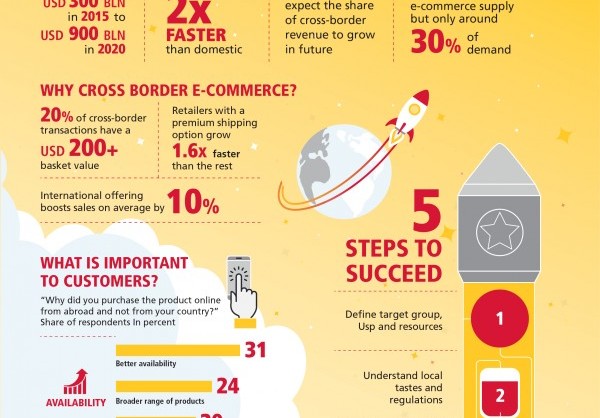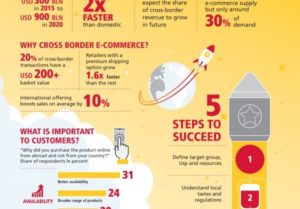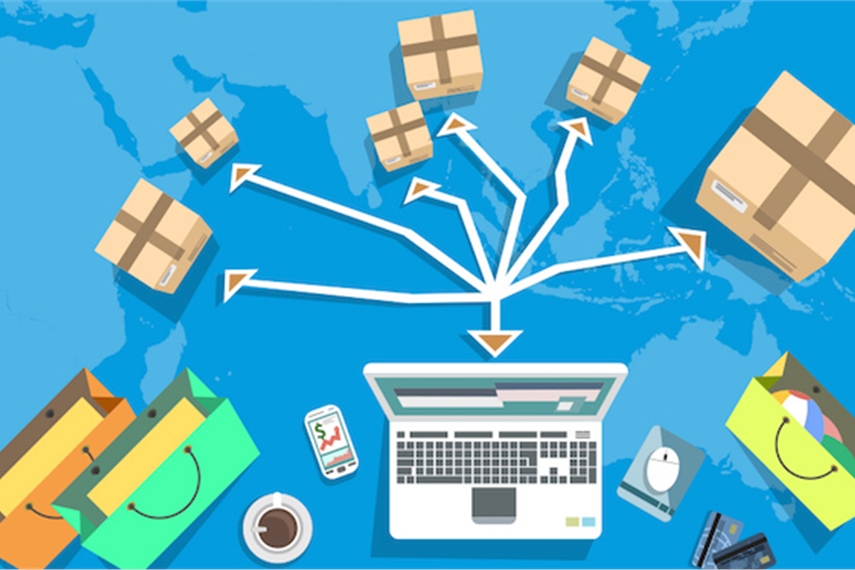Economy
Cross-Border e-Commerce to Grow Sub Saharan Africa Retailers


By Modupe Gbadeyanka
DHL Express, the world’s leading international express services provider, has published research highlighting the significant growth opportunity for retailers and manufacturers with an international online product offering.
The report – The 21st Century Spice Trade: A Guide to the Cross-Border E-Commerce Opportunity – looks in detail at the markets and products that offer the highest growth potential, the motivations and preferences of customers making international online purchases and the success factors for online retailers that wish to expand overseas.
It focuses in particular on the opportunity for premium products and service offerings, with higher basket values accounting for a significantly higher proportion of orders in cross-border transactions.
The report reveals that cross-border e-commerce offers aggregate growth rates not available in most other retail markets: cross-border retail volumes are predicted to increase at an annual average rate of 25% between 2015 and 2020 (from $300 billion to $900 billion) – twice the pace of domestic e-commerce growth.
Online retailers are also boosting sales by 10-15% on average simply by extending their offering to international customers.
An additional boost comes from including a premium service offering: retailers and manufacturers that incorporated a faster shipping option into their online stores grew 1.6 times faster on average than other players.
“Contrary to what many retailers think, cross-border shipping is actually simple and retailers in Sub Saharan Africa are perfectly positioned to take advantage of international opportunities. ‘Brand Africa’ is something that has increased exponentially in popularity in recent years and it’s time for retailers to remove the boundaries and open up their business to seamless international trade. Often, retailers choose not to promote their businesses internationally, and worse yet, will turn down international sales interests due to the misconception that it’s too difficult to manage and deliver,” says Hennie Heymans, CEO for DHL Express Sub Saharan Africa.
“Globally, our experience is that virtually every product category has the potential to upgrade to become premium, both by developing higher quality luxury editions and by offering superior levels of service quality to meet the demands of less price-sensitive customers. The opportunity to ‘go global’ and ‘go premium’ is available to retailers in all markets and our global door-to-door time definite network is well-positioned to support retailers looking to develop a premium service offering or directly reach new international markets without the need to invest in distribution or warehousing. In Sub Saharan Africa, the opportunity for Intra Africa trade should not be ignored. ‘Going global’ does not only mean trading outside of the African continent, Africa is home to one of the world’s fastest growing middle class, with an appetite for quality products and services. There are also a number of trade blocs in place to support Intra Africa trade growth and retailers should take advantage of this captive market.”
The report is based primarily on research and in-depth interviews conducted by a leading global management consultancy, as well as more than 1,800 responses to a proprietary exporter survey of retailers and manufacturers in six countries. It casts a light on the evolving face of e-commerce, with both supply and demand becoming more sophisticated Manufacturers are increasingly taking advantage of e-commerce to move to direct retail models – bypassing the ‘middleman’ and offering their products online to the end customer – and expect to grow 30% faster in cross-border e-commerce than other retailer groups. Customers in many markets are also becoming more discerning, citing product availability and trust, as well as attractive offers, as the motivating factors for shopping with overseas online retailers.
The main challenges highlighted by consumers to cross-border purchases relate to logistics, trust, price and customer experience. At the same time, online retailers can take a number of relatively easy steps to identify, cultivate and service demand from abroad. The report noted that the e-commerce trend has given birth to a new eco-system of facilitators and off-the-shelf solutions (such as payment providers and programs that localize a website’s check-out experience for the visitor), helping retailers to adapt their offering to the digital world and to transact with customers in foreign markets. Global logistics partners can provide support in identifying the right trade-off between centralized and local warehousing and fulfillment, while fast, reliable and flexible delivery options can be an important tool in turning speculative interest into long-term customer loyalty.
Economy
Nigeria’s Economy Expands 4.07% in Q4 2025

By Adedapo Adesanya
Nigeria’s economy, measured by gross domestic product (GDP), grew by 4.07 per cent (year-on-year) in real terms in the fourth quarter (Q4) of 2025.
The National Bureau of Statistics (NBS) announced the development in its latest GDP report for Q4 2025 on Friday.
The latest figure represents an improvement over the 3.76 per cent growth recorded in the corresponding period of 2024, signalling sustained recovery across key sectors of the economy. The growth rate was faster than the third quarter’s 3.98 per cent.
The report confirmed that Nigeria’s oil sector grew 6.79 per cent year-on-year and the non-oil part of the economy expanded by 3.99 per cent.
Nigeria’s average daily oil production stood at 1.58 million barrels per day in the final three months of 2025. That was lower than the third quarter’s output of 1.64 million barrels per day but higher than the 1.54 million barrels per day in the fourth quarter of 2024.
Breakdown of the data showed that the agriculture sector grew by 4.00 per cent in the fourth quarter of 2025. This marks a significant increase compared to the 2.54 per cent growth recorded in the same quarter of 2024, reflecting improved output and resilience in the sector.
The industry sector also recorded a stronger performance during the period under review. It grew by 3.88 per cent year-on-year, up from 2.49 per cent posted in the fourth quarter of 2024. The improvement suggests enhanced activity in manufacturing, construction, and related industrial sub-sectors.
The services sector maintained its position as a major growth driver, expanding by 4.15 per cent in Q4 2025. However, this was slightly lower than the 4.75 per cent growth recorded in the corresponding quarter of the previous year.
Overall, the 4.07 per cent GDP growth in the final quarter of 2025 underscores broad-based expansion across agriculture, industry, and services, despite a marginal moderation in services growth.
The Q4 performance provides further evidence of strengthening economic momentum, with improvements recorded in both agriculture and industry compared to the previous year.
Economy
Flour Mills Supports 2026 Paris International Agricultural Show

By Modupe Gbadeyanka
For the second time, Flour Mills of Nigeria Plc is sponsoring the Paris International Agricultural Show (PIAS) as part of its strategies to fortify its ties with France.
The 2026 PIAS kicked off on February 21 and will end on March 1, with about 607,503 visitors, nearly 4,000 animals, and over 1,000 exhibitors in attendance last year, and this year’s programme has already shown signs of being bigger and better.
The theme for this year’s event is Generations Solution. It is to foster knowledge transfer from younger generations and structure processes through which knowledge can be harnessed to drive technological advancement within the global agricultural sector.
In his address on the inaugural day of the Nigerian Pavilion on February 23, the Managing Director for FMN Agro and Director of Strategic Engagement/Stakeholder Relations, Mr Sadiq Usman, said, “At FMN, our mission is Feeding and Enriching Lives Every Day.
“This is a mandate we have fulfilled through decades of economic shifts, rooted in a culture of deep resilience and constant innovation. We support this pavilion because FMN recognises that the next frontier of global Agribusiness lies in high-level technical exchange.
“We thank the France-Nigeria Business Council (FNBC), the organisers of the PIAS, and our fellow members of the Nigerian Pavilion – Dangote, BUA, Zenith, Access, and our partners at Creativo El Matador and Soilless Farm Lab— we are exceedingly pleased to work to showcase the true face of Nigerian commerce.”
Speaking on the invaluable nature of the relationship between Nigeria and France, and the FMN’s commitment to process and product innovation, Mr John G. Coumantaros, stated, “The France – Nigeria relationship is a valuable partnership built on a shared value agenda that fosters remarkable Intercontinental trade growth.
“Also, as an organisation with over six decades of transformational footprint in Nigeria and progressively across the African Continent, FMN has been unwaveringly committed to product and process innovation.
“Therefore, our continuous partnership with France for the success of the Paris International Agricultural Show further buttresses the thriving relationship between both countries.”
PIAS is one of the most widely attended agricultural shows, with thousands of people from across the world in attendance.
Economy
NEITI Backs Tinubu’s Executive Order 9 on Oil Revenue Remittances

By Adedapo Adesanya
Despite reservations from some quarters, the Nigeria Extractive Industries Transparency Initiative (NEITI) has praised President Bola Tinubu’s Executive Order 9, which mandates direct remittances of all government revenues from tax oil, profit oil, profit gas, and royalty oil under Production Sharing Contracts, profit sharing, and risk service contracts straight to the Federation Account.
Issued on February 13, 2026, the order aims to safeguard oil and gas revenues, curb wasteful spending, and eliminate leakages by requiring operators to pay all entitlements directly into the federation account.
NEITI executive secretary, Musa Sarkin Adar, called it “a bold step in ongoing fiscal reforms to improve financial transparency, strengthen accountability, and mobilise resources for citizens’ development,” noting that the directive aligns with Section 162 of Nigeria’s Constitution.
He noted that for 20 years, NEITI has pushed for all government revenues to flow into the Federation Account transparently, calling the move a win.
For instance, in its 2017 report titled Unremitted Funds, Economic Recovery and Oil Sector Reform, NEITI revealed that over $20 billion in due remittances had not reached the government, fueling fiscal woes and prompting high-level reforms.
Mr Adar described the order as a key milestone in Nigeria’s EITI implementation and urged amendments to align it with these reforms.
He affirmed NEITI’s role in the Petroleum Industry Act (PIA) and pledged close collaboration with stakeholders, anti-corruption bodies, and partners to sustain transparent management of Nigeria’s mineral resources.
Meanwhile, others like the Petroleum and Natural Gas Senior Staff Association of Nigeria (PENGASSAN) have kicked against the order, saying it poses a serious threat to the stability of the oil and gas industry, calling it a “direct attack” on the PIA.
Speaking at the union’s National Executive Council (NEC) meeting in Abuja on Tuesday, PENGASSAN President, Mr Festus Osifo, said provisions of the order, particularly the directive to remit 30 per cent of profit oil from Production Sharing Contracts (PSCs) directly to the Federation Account, could destabilise operations at the Nigerian National Petroleum Company (NNPC) Limited.
Mr Osifo firmly dispelled rumours of imminent protests by the union, despite widespread claims that the controversial executive order threatens the livelihoods of 10,000 senior staff workers at NNPC.
He noted, however, that the union had begun engagements with government officials, including the Presidential Implementation Committee, and expressed optimism that common ground would be reached.
Mr Osifo, who also serves as President of the Trade Union Congress (TUC), expressed concerns that diverting the 30 per cent profit oil allocation to the Federation Account Allocation Committee (FAAC), without clearly defining how the statutory management fee would be refunded to NNPC, could affect the salaries of hundreds of PENGASSAN members.
-

 Feature/OPED6 years ago
Feature/OPED6 years agoDavos was Different this year
-
Travel/Tourism10 years ago
Lagos Seals Western Lodge Hotel In Ikorodu
-

 Showbiz3 years ago
Showbiz3 years agoEstranged Lover Releases Videos of Empress Njamah Bathing
-

 Banking8 years ago
Banking8 years agoSort Codes of GTBank Branches in Nigeria
-

 Economy3 years ago
Economy3 years agoSubsidy Removal: CNG at N130 Per Litre Cheaper Than Petrol—IPMAN
-

 Banking3 years ago
Banking3 years agoSort Codes of UBA Branches in Nigeria
-

 Banking3 years ago
Banking3 years agoFirst Bank Announces Planned Downtime
-

 Sports3 years ago
Sports3 years agoHighest Paid Nigerian Footballer – How Much Do Nigerian Footballers Earn













